How TV policy tuned out
Andrew Trounson talks to Dr Nigel Dick about his PhD thesis Media Mavericks, completed at 87 years old, making him one of the oldest people to complete a doctorate at the university. His thesis argues the Menzies government made a serious mistake in granting too many commercial TV licences in Australian capital cities.
The political carve-up of TV licenses among the media barons meant financially Australian content never stood a chance

A veteran TV executive who for more than 60 years had a box seat view on the power plays between media magnates and politicians has slammed the country’s failure to ever develop a broadcasting policy to promote Australian content and limit the power of the private networks.
Nigel Dick, who was in the industry from when TV transmissions first began in 1956 as sales manager of what was to become Sir Frank Packer’s GTV9 in Victoria, has distilled insights from a 60 year career into a University of Melbourne University PhD thesis, making him at 87 one of the oldest people to complete a doctorate at the university
In his thesis Media Mavericks he argues the Menzies government made a serious mistake in granting too many commercial TV licences in Australian capital cities. It was ultimately a misguided attempt by the government to please the media owners and play them off against each other, he says.
"Governments have been scared of the media magnates," says Dick, who was a right hand man to Sir Frank. "They made room for all but not room for television to do the things that we thought at the time it should be doing."